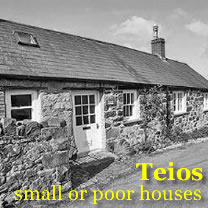
On the bus to Conwy today I noticed that the Welsh name of one of the stops included the word teios, which I hadn’t come across before. In English the stop had the word cottages in it.
I wrote down what I thought I heard and saw: teilios, but couldn’t find that in any Welsh dictionary. When I looked for cottages however I found the word teios, which is a combination of tai (plural of tŷ, house) and the diminutive ending -os, which was most commonly-used in North Wales (in the 18th and 19th centuries), but spread to the rest of Wales, according to the Geiriadur Prifysgol Cymru.
Translations of teios include small or poor houses; poor mean houses; and mean pitiful houses.
Some of the buses round here have a screen at the front that shows the name of the next stop in Welsh and English, and there are recorded announcements in both languages as well. The English announcements were recorded by someone with an English accent who mispronounces the Welsh names – he gets the consonants more or less right, but the vowels are often slightly off, and the stress is sometimes in the wrong place. I don’t know why they didn’t ask the guy who does the Welsh announcements to do the English ones as well.
When I hear a language or words pronounced in unusual ways it tends to grate a bit on my ears, just as out-of-tune singing or musical instruments do. There’s nothing wrong with foreign accents, but sometimes they can make comprehension more difficult. I try to speak languages (and sing and play instruments) as in tune as possibly. Do you?
Where I live recorded announcements are generally in Finnish, Swedish and English. All three languages are normally recorded by the same person, who tends to be someone who speaks both Finnish and Swedish at a native level but speaks English with a heavy Finnish accent. I don’t understand this. How hard can it be to find a native English speaker? In the rare cases where there is also a Russian recording it is always recorded by a second person who speaks native Russian. Why can’t they do the same with English?
I have been looking at some videos on Youtube posted by so-called polyglots.
One in particular, speaks n number of languages yet each sound remarkably similar so strong is his (Serbian?) accent and intonation. It reminds me that the previous pope was reputed to speak a number of languages-” each a version of Polish”. Unintelligible till you’d tuned your ear to the Polish channel.
@Laurits
You’ve hit on a problem with English being seen as the “world language”. As it belongs to all now, its pronunciation seems to be heavily influenced by the main language of the speaker. It renders it hard to decipher by native speakers until they, as I said above, tune in to the rhythm/prosody of the first language of the speaker.
We have the same problems on the London tube.
“The English announcements were recorded by someone with an English accent who mispronounces the Welsh names – he gets the consonants more or less right, but the vowels are often slightly off, and the stress is sometimes in the wrong place. I don’t know why they didn’t ask the guy who does the Welsh announcements to do the English ones as well.”
There is a recorded platforma announcement for the Arriva Trains Wales service from Birmingham to Pwllheli, obviously recorded by a non-Welsh speaker. Most of the station names are pronounced acceptably, but you can see a collective smirk come over the waiting passengers at Birmingham New Street when the announcer comes to the final syllables Abererch /ɜːtʃ/ (correct pronunciation /ɛrχ/) – and the final vowel of Talsarnau /u/ (there is lots or regional and register variation in the prounciation of final au – e.g /ai/, /e/, /a/ – but never /u/). Whilst errors like these are to be expected from someone without any knowledge of Welsh, it begs the question, could they not have found someone with at least basic Welsh from the train company to record the announcement? Could they not correct those two small but embarrassingly fundamental errors?
Another “objectionable” but this time intentional use of “accent” is in a lot of US-made movies (including documentaries with reenactment) is speaking English with a fake German accent when German should be spoken. Please, find a native speaker of German and use subtitles or just speak English. The fake German accent is just unbearable.
@Knitter
Yes, absolutely. I almost never got through Seven Years in Tibet. Brad Pitt with a fake German accent is just too much. Especially considering that his character wasn’t even German but Austrian.
@ Laurits
Thank you. It is nice to find out that somebody else is equally annoyed by this.
Some US films/TV dramas like to include Hong Kong gangsters. Maybe it is difficult to find actors who actually speaks Cantonese and looks like a gangster. Many Cantonese sentences spoken by the actors are unintelligible and I have to look at the English translation on the screen if I want to know what they are saying.
@ Ray.
Funny, sometimes I have to do the same thing with a little bit of Polish that shows up in American movies. Even if they don’t want to or cannot hire native speakers (it’s probably impossible to find actors in the US that would be native speakers of every language they need) how about just recording the voice of a native speaker instead of the English speaking actor. They can do all kinds of visual special effects, so why not use the “real thing” for language? Maybe I am just too picky…